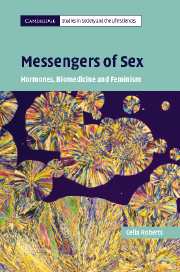Book contents
- Frontmatter
- Contents
- List of figures
- A message to readers
- Acknowledgements
- Introduction: feminism, bodies and biological sex
- Part I HORMONE HISTORIES
- Part II HORMONAL BODIES
- Part III HORMONE CULTURES
- 4 Elixirs of sex: hormone-replacement therapies and contemporary life
- 5 The messaging effects of HRT
- 6 Hormones in the world
- Conclusion: hormones as provocation
- References
- Index
5 - The messaging effects of HRT
Published online by Cambridge University Press: 22 September 2009
- Frontmatter
- Contents
- List of figures
- A message to readers
- Acknowledgements
- Introduction: feminism, bodies and biological sex
- Part I HORMONE HISTORIES
- Part II HORMONAL BODIES
- Part III HORMONE CULTURES
- 4 Elixirs of sex: hormone-replacement therapies and contemporary life
- 5 The messaging effects of HRT
- 6 Hormones in the world
- Conclusion: hormones as provocation
- References
- Index
Summary
In her comparative analysis of menopause discourses in Japan and North America, anthropologist Margaret Lock suggests that aging women present a problem to contemporary societies. As discussed in Chapter 4, their very existence confounds enduring figurations of sexual difference as both binary and based on reproductivity. Women's move beyond (hetero) sexual exchange and reproduction challenges cultural conceptions of life itself. ‘Women have a better survival rate than men’, Lock writes,
this cannot be denied, but the very fact that they live longer seems to count as a stroke against them. Elderly women can only be troublesome to society, it seems, as though the present average life expectancy for men is the way things should be, and anything more is unnecessary, especially if these women can contribute neither to the continuity of the species nor to the pleasure of men.
(Lock 1993: 365–6)For over forty years, hormone-replacement therapy (HRT) has been offered as a solution to this problem. HRT promises to alleviate the physical and psychological suffering of women going through menopause and, as far as possible, to maintain women's participation in circuits of sexual exchange. Medical claims about HRT, however, do not only refer to women's sexuality, appearance, temperament and reproductivity, they also focus on illness and disease. HRT has been said to play a role in the prevention of serious health problems associated with aging, namely, osteoporosis, heart disease, Alzheimer's disease, colon cancer and rheumatoid arthritis.
- Type
- Chapter
- Information
- Messengers of SexHormones, Biomedicine and Feminism, pp. 137 - 161Publisher: Cambridge University PressPrint publication year: 2007

